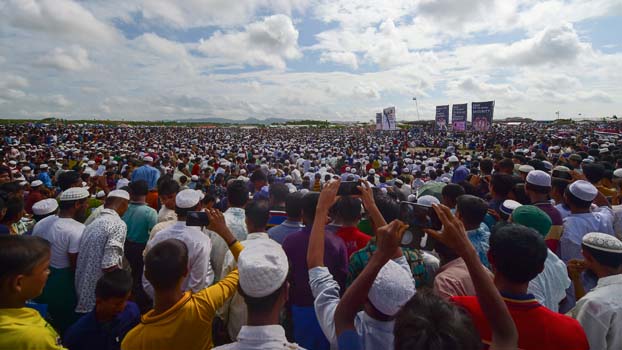Myanmar’s farcical response to take back Rohingyas


Some 200,000 Rohingyas rallied in a Bangladesh refugee camp to mark two years since they fled a violent crackdown by Myanmar forces, just days after a second failed attempt to repatriate the refugees. Myanmar should take the full responsibility for the failure of the second attempt to repatriate the Rohingya Muslims who fled from Myanmar to Bangladesh. The Myanmar government had approved more than 3,000 Rohingya to be brought back to the country beginning on August 22, but, as during the first repatriation attempt in November, no refugees agreed to voluntarily board the buses to Myanmar.
It needs no emphasizing that the responsibility of encouraging the displaced Rohingyas to opt for voluntary return lies entirely on Myanmar. But the government of Myanmar has done nothing that could be taken as a signal that it has any genuine interest in taking back the Rohingya people. The only reason the government of Myanmar agreed to take the Rohingya people back is due to the image crisis it faces internationally. It is Myanmar’s responsibility to create a genial environment in Rakhine through prudent actions.
As Myanmar has yet to address the systematic persecution and violence against the displaced Rohingyas, they have every reason to fear for their safety if they return. Many Rohingyas have said they would like to return to Myanmar so long as they don’t suffer the same abuse, indignities, and atrocities they have endured in the past. Bangladesh wants to resolve the Rohingya issue through peaceful negotiation, and the country expects similar reciprocity from Myanmar and international community. But the silence from the so-called international community is deafening and disturbing.
Rohingya influx has become a big threat to Bangladesh’s regional and national security. Experts address Rohingya refugee crisis as a time bomb that must be quickly defused to avoid any future flare-up. We are deeply concerned at the violence being committed by the Rohingya refugees which has created a tensed situation in Ukhia and Teknaf upazilas in Cox’s Bazaar. Being instigated by a number of unscrupulous agents of different global extremist groups, Rohingyas are increasingly taking the path of violence.
Rohingya camps in Cox’s Bazar have turned into paradises for criminals and drug-peddlers. Incident of confrontations among criminal gangs over control of markets, Yaba smuggling, and human trafficking have become very common. Forty-three Rohingyas were killed in the last two years in internal conflicts among these gangs while 32 others died in gunfights with security forces. Nearly 1,100 Rohingyas have been accused in 471 cases – 208 of them related to narcotics – since the influx began in late August 2017.
The recent murder of a local ruling party official at a refugee camp triggered violent protests as disgruntled locals vandalised and blockaded the Jadimura Rohingya camp in Cox's Bazar's Teknaf. This certainly reflects the chaotic situation prevailing in these areas where the life and livelihood of locals have been overwhelmed due to the persistent presence of Rohingya refugees.
However, following the incident both locals and Rohingya refugees are feeling insecure which could worsen the already strained relations between locals and Rohingyas.
Considering the prevailing chaotic situation, of late, the government has planned to set up barbed wire-fencing surrounding all the Rohingya camps in Cox's Bazaar. We are told that the initiatives taken in the wake of criminal activities by the Rohingyas are aimed at stopping their criminal acts. In this regard, it is worth mentioning that the mere fencing would not be able to restrain Rohingya criminals and smugglers from doing their illegal deeds.
The constant onslaught of trafficking and drug gangs in the Rohingya camps make it logistically very challenging to provide adequate security in most of the Rohingya camps. Although there is police presence in these camps along with other officials and their associates, it is not enough to combat the crimes. It is a situation that is inevitable when thousands of desperate people are forced to stay in cramped, unhygienic conditions for months on end.
It is high time that the authorities concerned beef up security as much as possible and catch the perpetrators especially the gangs that are carrying out criminal activities. Considering the prevailing situation in the refugee camps, authorities concerned should take immediate actions to establish law and order in the Rohingya camps and surrounding areas. The authorities should do the needful to restrain locals from taking law into their own hands.
Dhaka has always been serious about a safe repatriation of the refugees. It has done its best to help the Rohingyas return to their homes. The onus now is on Myanmar authorities to address the Rohingya issue sincerely and convincingly. The situation demands concrete intervention from international community to intensify pressure on Myanmar to create a congenial environment for Rohingya repatriation. Bangladesh expects a more vigorous role of the international community in the diplomatic front to compel Myanmar to take back the Rohingyas. China is offering mediation after two failed attempts to help Myanmar and Bangladesh start the process to repatriate Rohingya refugees. We hope China will play a decisive role in Rohingya repatriation by exerting its influence on Myanmar in no time.
Sayeed Hossain Shuvro is Editorial Assistant, Bangladesh Post



